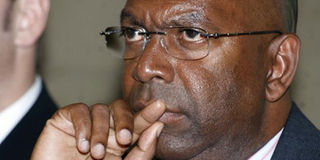Safaricom takes price wars to Parliament

Safaricom CEO, Mr Bob Collymore. Photo/FREDRICK ONYANGO
Kenya’s mobile telephony giant, Safaricom on Tuesday turned to Parliament in their bid to have its rivals’ cheaper calling rates tamed.
At a meeting with Parliament’s Energy and Communication Committee, the Safaricom delegation led by the Chief Executive, Mr Bob Collymore, said the low calling rates to other networks meant it will have to go slow on its expansion plan.
The mobile giant gave examples of similar price wars in Uganda, Sri Lanka, and the Democratic Republic of Congo, all of which were geared to show the dangers of low “mobile termination rates” –money charged for making calls across networks.
The Sri Lankan example, the committee heard, was in 2009 when a new operator entered the market and ignited a price war by lowering calling prices significantly with the effect that most subscribers were calling outside the network.
With less incoming revenues –there’s was no interconnection fee back then—the other operators threatened to stop the interconnection because they were not being compensated for the increase in incoming traffic.
The DRC example is more like the Kenyan one where one of the operators reduced calling rates from Sh20 to 80 cents. This led to operators making very modest amounts.
“Due to low revenues, operators resulted in cost-cutting measures, such as switching off the networks in areas with low average returns per user, poor quality of service and reduction in network expansion,” reads a brief presented by Mr Collymore to the committee.
With the situation threatening to spiral out of control, the DRC regulator intervened prescribing a minimum price of Sh11 for voice calls and Sh2 for text messages.
Speaking to the Nation, the Committee chairman, Mr James Rege, said the House team had already met Airtel Kenya, and heard a presentation on the rationale for their low prices.
The committee, Mr Rege said, will now meet the Communications Commission of Kenya (CCK) and other operators to find the way forward in the on-going price wars.
Airtel Kenya slashed calling rates to Sh1 per minute during the day sending its rivals sent its rivals, Safaricom, Telkom Kenya and Essar Telecom, back to the drawing board in search of a viable and effective response.
Operators and analysts, who seem uncomfortable with Airtel’s model warn that if further price reductions are to continue, massive job cuts, loss of government revenue and deteriorating quality of service will be inevitable.
Safaricom and Orange are warning that the model may threaten the viability of the Kenyan mobile industry and significantly dent government earnings from the industry
But consumers have been happy by the low calling rates saying it frees part of their income to be spent in managing the soaring food prices.



